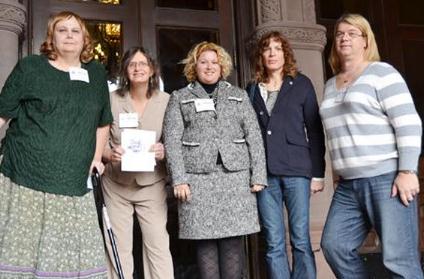
Members of the Trans Lobby Group at Queen's Park in 2010. Credit: Andrea Houston (file photo)
In what a London lawyer is calling a “game-changing decision,” the Ontario Human Rights Tribunal has struck down a rule that required trans people to undergo “transsexual surgery” in order to change the sex category on their birth certificates.
Released April 11, the 95-page decision follows a challenge by one trans woman who complained she was discriminated against because she could not change her legal documents unless she had surgery. However, she did have surgery in 2008.
“She had an orchiectomy (the removal of the testicles), at least in part to satisfy the requirement to change the sex designation,” explains lawyer N Nicole Nussbaum.
The tribunal found that the Vital Statistics Act requirement of “transsexual surgery” prior to changing the sex designation on a birth certificate discriminates against trans people, she says. The provincial government has been ordered to remove this stipulation.
“They completely knocked that out,” Nussbaum says. “The tribunal doesn’t have the authority to strike down a law, but they can say the law is not enforceable.”
An emotional Susan Gapka, the chair of the Trans Lobby Group, says she is still poring over the decision. She tells Xtra it is a key building block toward allowing trans people to be included in society. She hopes it will support Toby’s Law, which is currently moving through the provincial legislature. Toby’s Law would amend the Ontario Human Rights Code to include gender identity and gender expression.
“I’m absolutely ecstatic,” she says, noting Ontario will be the first Canadian province to legally recognize this distinction. “This is a very good decision. It supports what we have been saying all along, and now the court has acknowledged that.”
As a result of the decision, Ontario now has 180 days to revise the criteria for sex designation change. The government must now present “some alternate requirement,” Nussbaum says. “One idea that is being considered is having a guarantor process, so there would be some third-party guarantor confirm that a person is living in a particular gender.”
The precedent-setting decision could force changes to legislation in other provinces and territories, she says.
Additionally, the birth certificate is used as a foundation document to change federal identifications, such as passports. “It will be also interesting to see how this affects passports, which also has a surgical requirement. This decision may be enough to change policy on a national level.”
Gapka agrees. “This is a clear signal to the federal government, and all legislatures across the country, that Ontario is leading the way in harmonizing and modernizing the way legal documents are distributed and accessed by trans people. This is a wonderful day.”
During the provincial election in October, Trans Lobby Group activist Christin Milloy, who was running for the Libertarian Party in Mississauga–Brampton South, made the issue one of her platform priorities.
“There’s a lot of bureaucracy in changing your sex designation in Ontario,” she told Xtra at the time. “For the birth certificate, which is issued by the province, proof of transsexual surgery is required. That’s the exact phrase they use.”
SRS was first listed by OHIP in 1971, but then-premier Mike Harris cut the funding in 1998, Gapka explains. The procedure was relisted under the Ontario Liberals in 2008. At the time, the minister of health, George Smitherman, said eight to 10 people undergo SRS every year at a total annual cost of about $200,000.
Ontario Tribunal Decision on Vital Statistics Act surgery requirement

 Why you can trust Xtra
Why you can trust Xtra


